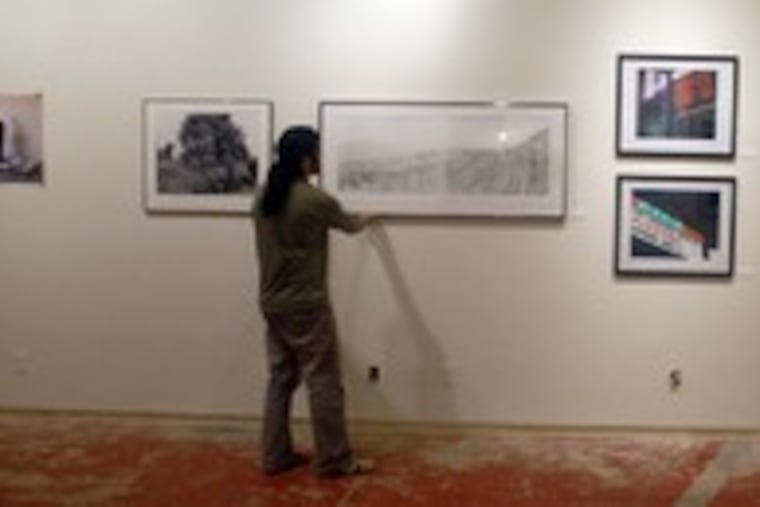The picture place
A young Tokyo native reframes an old Kensington club into Project Basho, a center for photography done the careful, old-fashioned way.

Club Independence, situated in a vacant acre of Kensington, was appropriately named. It was independent of plumbing, heating and electricity, even walls.
Tsuyoshi Ito envisioned everything in the shell. The Tokyo native saw two darkrooms, a work area for courses and workshops, a gallery and studio, and a center for photography where area enthusiasts would gather.
Four years later, Project Basho - Japanese for place - is open for business with 10 enlargers, a full complement of courses, an inaugural gallery exhibit, "Friends of Project Basho," and the juried competition "Onward," which attracted 300 photographers with 1,200 entries.
It's a modest place - the Basho sign is barely visible on the gated front door - with grand ambition.
Ito, 33, is a calm, quiet man with a gift for making what he wants happen. He did most of the construction work himself, despite the absence of formal training, ultimately removing eight 40-cubic-yard Dumpsters piled with junk from the lot. He designed the apartment on the second floor where he now lives, a basho above Project Basho.
Ito arrived in Philadelphia 11 years ago, transferring to Temple University's main campus to study history after beginning at the school's Tokyo site. Already smitten with photography, Ito looked around the city and discovered "there was nothing like this where photographers could work and network. There was no center to learn and create outside of an academic setting."
What he did find, though, "was a serious community of committed photographers," Ito says, sitting in Project Basho's front workshop room. He held a job in a Center City photo lab while taking photography courses and planning his center.
"What Yoshi is doing is creating a community he wants to be part of," says leading photographer Andrea Modica, a Drexel professor who judged the "Onward" competition. "Other people can complain about their situation, but he sees something missing and makes it happen," Modica says. "That's extraordinary, with the byproduct being a wonderful community the rest of us can be a part of."
His former teacher jokes that Ito's passion was so marked when they first met five years ago that "Tsuyoshi was the only student who came to class on time," Modica says, "and I was teaching in New York City and he was coming from Philadelphia."
Ito is as interested in printing techniques as in shooting, working as he does with a trio of 80-year-old cameras - a Korona, Rembrandt and Deardorff - purchased on eBay and utilizing costly palladium and platinum processes, which give images a historic, otherworldly look. A mere 25 grams of palladium can run $250, while platinum is twice that, with photographers pooling resources to purchase vital materials. Printing as a craft has fallen by the wayside in the age of jpegs and $80 digital printers, though not for photographers who are serious about their work.
"Professional photographers get paid for their work but plenty of photographers who do it for love do amazing things," says Ito, who barely makes a living but is loath to complain. "The level of appreciation for serious amateur photography isn't as great as it should be."
Ito's mother, a teacher in Tokyo, has been an ardent financial supporter. He hasn't been back to see his family in 11 years, but hopes to return soon.
Project Basho's two darkrooms, one for color, one for black-and-white, are a throwback in the age of digital. They're reserved for $8 an hour for black-and-white, $10 for color, all chemicals supplied. Photographers are responsible for their printing paper.
"When you're working in your own darkroom, there's no one to communicate with," says Robert Cocozza, a retired accountant dedicated to his black-and-white photography who visits Project Basho once a week for several hours. "I'm improving my skill level. Yoshi has a very sensitive eye. He's a good critic and teacher."
Photographer Kara LaFleur speaks of the center "as the only darkroom in the area that I know of where you can print color. Yoshi's really fostering a sense of community that's warm and inviting, where people can share their thoughts. I enjoy socializing there as much as working there."
Evening classes are offered as well as two-day weekend workshops, with fees ranging from $150 to $500.
Ito has benefited personally from the courses: His girlfriend, Christa Cywinski, is a former workshop student.
"Yoshi is someone who is really enthusiastic about the medium and he's devoted to making a community of photographers feel supported," says Genevieve Coutroubis, director of programs at the Center for Emerging Visual Artists and a photographer who regularly works at Project Basho.
"You can't make anything in a vacuum," Ito says. "It helps to talk with others."
Ito's current project is a photographic version of Katsushika Hokusai's 19th-century woodblock series 36 Views of Mount Fuji. Ito's 36 Views of Philadelphia are vertical images taken at dusk with his 7-by-17-inch Korona from various city rooftops of friends' and friends-of-friends' buildings. He's perpetually scouting for new locations. The project will require considerable time as Ito is hampered by historic technology, able to take only eight images at a time, spending $50 on each excursion before printing.
Ito is quite happy to work slowly at a time when so much is done quickly.
"Virtually, everyone is a photographer in the digital age. The joke is if you buy a camera, you're a photographer," he says. "But if you buy a piano, you just own a piano."
Ito is fully committed to changing that view.
Project Basho
Project Basho is located at 1305 Germantown Ave., a block north of Third and Girard. For information, call 215-238-0928 or go to www.projectbasho.org.
EndText